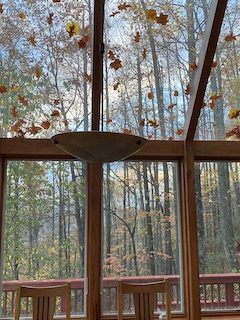
Today dawned full of purpose. Weekend rains—which arrived after the 1951-ers’ lunch here on a glorious Friday—left a carpet of leaves to sweep from the dining room greenhouse windows and off the deck. There are dogs to walk and neighbors to check on, cooking to do, practicing, laundry, reading, writing, and more leaves to blow out of ditches along the mountain road, an on-going activity.
From the All Saints’ Day Bible study lesson at church yesterday: “Jesus insisted that faith is more than sentimental ‘believing’ or merely intellectual agreement with theological propositions. It involves a relationship with Him that is expressed in a godly lifestyle that honors Him. The classic analysis of faith listed three ingredients: knowledge, assent, and trust… [and] action. In Christian discipleship, faith always acts on the basis of its trust in God’s good will.”
A dozen years ago, I could not have imagined this, my life here at Vanaprastha. It took me a while to find my purpose, and I know I’m not alone in this quest for the next mission after retirement. I wrote about my discovery process for The Sage Forum’s November Newsletter, the article reprinted below.

I remember July 1, 2010 as if it was yesterday. That morning, I attended a STEM planning meeting as the curriculum technologist. Afterward, I cleaned out my corner of the Tech Office, turned in my keys, and said my goodbyes. I’d said goodbye to fulltime parenting eight years prior, but still had a career to define my purpose. Now, walking to my car along the school’s lush, tree-shaded driveway, I sensed this was it: my last day as a teacher. Driving home, I went deep into my heart and prayed: I know this is what you want me to do, but without teaching or parenting, I don’t know who I am anymore or what I’m called to do.
I had entered the third stage of life. And that made me anxious. Very anxious.
In a recent reflection titled “The Second Journey,” Franciscan priest Richard Rohr wrote, “Most of us tend to think of the second half of life as largely about getting old, dealing with health issues, and letting go of our physical life, but I simply don’t believe that’s all there is to it. What looks like falling can largely be experienced as falling upward and onward, into a broader and deeper world, where the soul finds its fullness, is finally connected to the whole, and lives inside the Big Picture.” I understand what Rohr means now. But back in 2010, I wasn’t thinking about a second journey or falling upward. I was just trying to figure out what’s next. Maybe I’d do what my mother did: retire from teaching then go back as a volunteer.
Knowing me well, my husband said, “Wait. Don’t fill up your time by saying yes to everything. Otherwise, when opportunities happen, you won’t have time for them.” My mother also knew me well, having given me a t-shirt that read, “Stress: When your gut says no and your mouth says, ‘Sure, I’d be glad to.’” Sound familiar? My husband had two additional pieces of advice. “If it’s not your mission, Sweetheart, you’ll be taking that away from another person.” I certainly didn’t want to deprive anyone of their mission. Then this: “Your unease is what opportunity feels like.” And so, I waited patiently for the Lord; he inclined to me and heard my cry. (Psalm 40:1). Waiting for the Lord as King David did, except for the unease and that word patiently.
I was not idle while waiting less than patiently, listening, and watching for doors to open. My husband and I were building a house on our land in the Blue Ridge Mountains. In addition to overseeing finances and house-building, I walked the dog, tried new recipes, kept in touch with our children and two aging parents, and read. One book I devoured during that waiting time was George Mason University Professor Todd Kashdan’s writing about curiosity. He stated that as we move through life-stages—from our student years into work-family life then into the third stage—our wants and paths to purpose change.
To test his hypothesis, I made a stage-by-stage list of wants. As a child, I wanted to be accepted, attractive, and autonomous, to achieve and be in control of my life. My adult wants looked a little different, more like goals: to be affirmed, committed to family, industrious, and successful in my profession.
Many people identify themselves by their professions, and I was no exception. Thus, my anxiety when no longer an active parent or working teacher. It wasn’t until I traversed Michelle Van Loon’s first-half-of-life spiritual growth stages, as defined in Becoming Sage: Cultivating Meaning, Purpose, and Spirituality in Midlife—“God, I believe in You,” “God, I belong to You,” and “God, I’m working for You,”—that I discovered my latter-stage-of-life wants: challenge, growth, health, humility, and identity in Christ. His purpose, not mine. Or as Paul stated in 2 Timothy 1:9, He has saved us and called us to a holy life—not because of anything we have done but because of his own purpose and grace. This grace was given us in Christ Jesus before the beginning of time.
Regarding paths to purpose, Kashdan identified three: how we learn (observing, imitating, modeling), how we respond to life-changing events, and what we seek. For example:
- Learn: In my third stage of life, I became a writer and took classes, joined critique groups, attended conferences, and found mentors.
- Life-changing events: As we buried the last of our surviving parents, my husband and I thought about own our deaths and destinies—what we would leave to others.
- Seek: Openness, staying grounded in my identity as a child of God, maturity in faith and growth in wisdom. In other words, The Sage Forum’s mission.
Theologian, elder, and Benedictine Sister Joan Chittister had this to say about one’s path to purpose in the third stage of life: “This is the period of life when we must begin to look inside our own hearts and souls rather than outside ourselves for the answers to our problems, for the fixing of the problems. This is the time for facing ourselves, for bringing ourselves into the light.” So, here I am seeking the light by writing and, in so doing, yes, teaching.
Now well into my third stage of life, I offer this advice to those on the threshold:
- List your wants and paths to purpose for each stage.
- Pray for discernment.
- Wait, listen, and watch for open doors, the opportunities.
- Embrace learning new things and reach out to mentors.
- Stay grounded in third-stage faith when life-changing events happen—and they will.
One last thought. The greatest blessing during this stage of life is to become a grandparent, even if you don’t have grandchildren. Grandparents are elders, uniquely positioned to mentor, encourage, support, and guide those in the first stage of life while their parents pursue second-stage wants. Rather than sages on the stage, grandparents are “been there, done that” guides on the side. By letting go of our earlier wants, we can embrace openness, growth, and spiritual truth then pass that wisdom on to others.
Maturing in faith and encouraging others. I can’t think of a better life purpose, can you?



Carole, thanks for your encouraging message. I can vividly remember my final day of teaching after 40 years. While I didn’t honestly know what might lie ahead, I was ready for the eventual adventures waiting for me. May God’s blessings continue to fill you and Keith with much peace.
Always good to hear from you, Richard. Your adventures in writing continue your teaching mission. Blessings! -C.D.